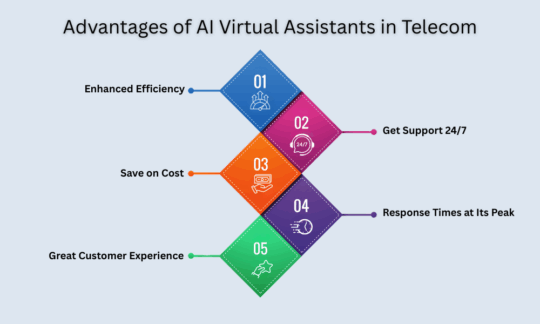Suppose you’ve purchased a product online and are trying to reach customer support. Despite ringing the number several times, you received no response. This becomes annoying. But do you know the new facet that’s booming rapidly?
Well, it’s an AI virtual assistant transforming the telecom industry. Say goodbye to delayed phone answers! Get faster responses to phone calls and get your queries resolved in a matter of minutes. This represents a significant advancement in telecom, streamlining organizational operations while enhancing efficiency and elevating customer service to the next level.
According to 2024 Nvidia study, around 90% of telecom companies are adopting AI, with 48% in the initial phase and 41% already utilizing AI.
Want to learn more about virtual assistants in the telecom industry? This blog is for you! Let’s get straight to what virtual assistants are, benefits in customer support, challenges, and more.
Here we begin!
Meaning of Virtual Assistants
In the telecommunications sector, virtual assistants are essentially AI-powered systems that automate tasks, answer customer questions, and increase overall operational efficiency. They aim to ease human work and help the customer with any technical issues, billing issues, shopping issues, and any other customer question. Alongside, one of the major benefits is that the AI virtual assistants are available 24/7 and can efficiently handle multiple queries from customers at the same time. They work in combination of AI technologies, including NLP, Machine Learning (ML) and more.
Virtual assistants can accurately respond to repetitive customer questions. The following are some examples:
- Answering questions about bills. (Please share my current bill)
- Processing service requests. (I need to upgrade my plan)
Importance of Customer Support in Telecom
Customer support today is the heart of the business. Even a slight delay in addressing issues can impact the business's credibility. Traditional calling methods come with limitations such as long waiting periods and restricted availability.
Thus, there’s a need for an ultimate solution that can outperform the traditional method and provide support to fill the gap. AI-powered virtual assistants are here to make a major shift in the telecom landscape. With all the standout features, such as 24/7 availability, faster response times, and efficient call management, among others. It’s here to take the customer experience to the next level.
What are the Advantages of AI Virtual Assistants in Telecom?
Look at the top benefits of AI virtual assistant for telecom:
- Enhanced Efficiency
Companies strive to provide the best customer support possible to make a lasting impression. AI virtual assistants in telecom, as discussed above, can easily handle similar queries asked by customers at the same time. For example: 10 customers may ask the same question, “How to upgrade my sim service to a high-tier plan?” This enables companies to enhance their response times and increase their overall customer success rate. - Get Support 24/7
In telecommunications, availability is the most vital factor to consider. The AI assistants are available for assistance 24/7. No matter if you make a call at around 1:00 AM, irrespective of the time zone or business hours, they will respond immediately. So, no more worrying about your issue being unresolved for hours! - Save on Cost
There is no need to invest in customer care for repetitive tasks. This way, businesses can reduce operational costs while providing the best customer service. - Response Times at Its Peak
Long delays are a thing of the past! Ring up, and the AI chatbot is here to provide a quick answer to any query or information the client needs. - Great Customer Experience
Telecom companies can utilize AI to meet their customer needs by providing personalized service as well as continuing to aid them along their buyer's journey. AI can also help telcos uncover and analyze patterns in customer behavior and customer engagements for they are able to analyze the full sum demographics data quickly through AI.
Challenges of AI in Telecommunication
As we discussed the benefits above, AI-powered chatbots have some limitations, as outlined below.
- Investment in the First Place
It’s evident that incorporating any new technology requires investment. Organizations should invest in LLM models or also allocate resources to hiring new employees. - Connecting Legacy Systems
Today, many telecom companies still employ outdated, low-level systems incompatible with AI technologies. Thus, they need to invest further in IT infrastructure or switch to cloud platforms to work effectively with AI chatbots, which can be more expensive. - Data Privacy Issues
Safeguarding client information presents another difficulty. AI chatbots handle sensitive data, and telecom firms must ensure robust data privacy and security to prevent breaches and maintain consumer confidence.
Wrapping it Up!
AI-powered virtual assistants are here to transform the telcos scenario completely. By offering instant and next-level support, personalized answers, resolving repetitive queries, and more, chatbots are an asset for companies worldwide.
The most crucial benefit is customer satisfaction, which is essential for business success. In this scenario, telecom companies are involved. AI is unstoppable, and the future is already filled with endless possibilities.
AI technologies are predicted to handle 85% of consumer contacts in the telecom industry by 2025.
Frequently Asked Questions
Q: What is a virtual phone assistant?
A: A virtual phone assistant (VA), as the name suggests, aims to respond to calls from customers regarding different issues or even information they need about a particular product or service. These are AI assistants that help improve the customer experience in short.
Q: What are the different types of virtual assistants
A: There are mainly three types of virtual assistants: Administrative (scheduling, email), Specialized (marketing, design), and AI (chatbots, voice assistants). Every virtual assistant is meant to meet specific business purposes.
Stay updated with all the latest blogs on diverse topics including AI, marketing, business and more here!
You might like:
AI Lexicons: The Language Behind Your Digital Assistant
Cloud Telephony: Definition, Key Features, and Business Benefits





